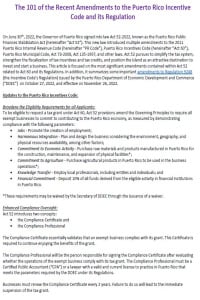On June 30th, 2022, the Governor of Puerto Rico signed into law Act 52-2022, known as the Puerto Rico Public Finances Stabilization Act (hereinafter “Act 52”). This new law introduced multiple amendments to the 2011 Puerto Rico Internal Revenue Code (hereinafter “PR Code”), Puerto Rico Incentives Code (hereinafter “Act 60”), Puerto Rico Municipal Code, Act 73-2008, Act 135-1997, and other laws. Act 52 pursues to simplify the tax system, strengthen the fiscalization of tax incentives and tax credits, and position the island as an attractive destination to invest and start a business. This article is focused on the most significant amendments contained within Act 52 related to Act 60 and its Regulations.
In addition, it summarizes some important amendments to Regulation 9248 (the Incentive Code’s Regulation) issued by the Puerto Rico Department of Economic Development and Commerce (“DDEC”) on October 27, 2022, and effective on November 26, 2022.
Updates to the Puerto Rico Incentives Code:
Broadens the Eligibility Requirements for all Applicants:
To be eligible to request a tax grant under Act 60, Act 52 provisions amend the Governing Principles to require all exempt businesses to commit to contributing to the Puerto Rico economy, as measured by demonstrating compliance with the following parameters:
- Jobs - Promote the creation of employment;
- Harmonious Integration - Plan and design the business considering the environment, geography, and physical resources availability, among other factors;
- Commitment to Economic Activity - Purchase raw materials and products manufactured in Puerto Rico for the construction, maintenance, and expansion of physical facilities*;
- Commitment to Agriculture - Purchase agricultural products in Puerto Rico to be used in the business operations*;
- Knowledge Transfer - Employ local professionals, including entities and individuals; and
- Financial Commitment - Deposit 10% of all funds derived from the eligible activity in financial institutions in Puerto Rico.
*These requirements may be waived by the Secretary of DDEC through the issuance of a waiver.
Enhanced Compliance Oversight:
Act 52 introduces two concepts:
- the Compliance Certificate and
- the Compliance Professional
The Compliance Certificate essentially validates that an exempt business complies with its grant. This Certificate is required to continue enjoying the benefits of the grant.
The Compliance Professional will be the person responsible for signing the Compliance Certificate after evaluating whether the operations of the exempt business comply with its tax grant. The Compliance Professional must be a Certified Public Accountant (“CPA”) or a lawyer with a valid and current license to practice in Puerto Rico that meets the parameters required by the DDEC under its Regulations.
Businesses must renew the Compliance Certificate every 2 years. Failure to do so will lead to the immediate suspension of the tax grant.
Expanded Reporting Requirements:
As required by Act 60, all exempt businesses must present an annual report. The information included in this report will be subject to the evaluation of the Compliance Professional to approve or deny the Compliance Certificate. Act 52 mandates additional information to be included in the report, specifically:
- employment data and details on investments in products or services manufactured or rendered in Puerto Rico, as well as Puerto Rico banking activity,
- information on local purchases of raw materials or manufactured products in Puerto Rico, and
- professional, consulting, security, or maintenance services contracted with companies in Puerto Rico.
New Puerto Rico Treasury Platform to Manage the Tax Credits:
This amendment relates to the PR Code as well as Act 60. The PR Code was amended to establish that a new platform to manage tax credits will be implemented by the Puerto Rico Treasury Department (“Platform”). As part of this change, the use of available credits will be subject to certain limitations. A 3-year limit to claim the tax credits available to the business, commencing after the implementation of the new Platform. This limitation is applicable to credits issued prior to the implementation of the Platform. The Puerto Rico Secretary of the Treasury will be issuing an administrative publication to establish the commencement date of the first taxable year of the 3-year period. Act 60 includes this limitation in all tax credit dispositions.
Under the new amendments incorporated by Act 52, the use of the Research and Development Tax Credits for 2022 onwards may be delayed because the business must obtain an Accreditation Certificate to claim the first 50% installment. Pre-Act 52, the business was able to claim the first installment of the R&D Credit when the Special Eligible Investment was made. After the amendments, the language of Act 60 was adjusted to limit the possibility of claiming the first 50% portion when the Special Eligible Investment was made only for taxable years commencing on or before December 31, 2021. The second half of the credit use remained unchanged, that is, it may be claimed in subsequent years until exhausted.
Qualified Physicians:
Act 52 closed its doors to qualified physicians seeking new incentives or extensions to its grants. Beginning on July 1, 2022, the DDEC will no longer accept new applications or extensions for Qualified Physicians incentives. If a request for an extension of 15 additional years was desired, it must have been made before June 30, 2022, to be considered. Existing Qualified Physicians with approved grants will continue enjoying their benefits.
Act 216-2011:
As you may recall, Act 216 was established to gradually reduce certain incentives related to residential real estate property such as, tax exemptions on real property and tax exemption on the capital gains in connection to the sale of real property. The dispositions of Act 216 were integrated into Act 60.
Before the enactment of Act 52, all the benefits of Act 216 were in effect until December 31, 2030. The Act 52 amendments establish that the real property tax exemption sunsets on December 31, 2025, notwithstanding the date when the request was made. In addition, the Act 52 dispositions exclude from the benefits of act 216 properties with a purchase price of more than $300,000.
Updates to the Incentives Code Regulations
On August 15, 2022, the DDEC proposed amendments to the Regulations to address some of the observations raised by the Financial Oversight & Management Board of Puerto Rico (“the Board”). As mentioned above, these amendments were approved on October 27, 2022, and are effective on November 26, 2022.
New Regulatory Committee:
An Economic Incentives Review Committee (“CRIE”) will be established by the Secretary of the DDEC through an Administrative Order to advise and issue recommendations to the Secretary of the DDEC in connection with applications submitted for:
- cash grants,
- incentives for the film industry in Puerto Rico,
- tax credits for creative industries, tourism, R&D and products manufactured in Puerto Rico, and
- request of amendments for grants issued under Act 60.
The recommendations will be provided when the incentives exceed the threshold established by the Administrative Order. Any transaction that involves a business transfer will require the CRIE’s review, consent of the Puerto Rico Treasury, and the approval of the DDEC.
Creative Industries:
The amendments primarily address the following areas related to Creative Industries:
- expand on the details for general and project-specific eligibility requirements for a Film Project,
- expand on the eligible production costs,
- establish the criteria for the Application for Tax Credits and credit limitations, and
- designate areas of opportunity for the use of funds that promote the development of the film industry in Puerto Rico.
Other Reporting Requirements:
Regarding the Annual Incentives Report, the Secretary of the DDEC through an Administrative Order will establish the guidelines and use of information for the issuance of the report. The recommendations from the CRIE must be considered for the report as well.
For the exempt annual report, the amendments will allow an extension of the November 15 deadline in cases where the Secretary of the Puerto Rico Treasury Department extends the Income Tax Return Filing Deadline. The amendments will require certain grantees to present an Agreed Upon Procedure (“AUP”) with their exempt annual report. These are: an exempt business with gross income exceeding $1,000,000 and every Individual Resident Investor with a tax decree.
The amendments indicate that the commencement of operations in a new Municipality must be notified and meet the following parameters:
- Before relocating, the exempt business must notify the DDEC, the new municipality where operations will commence and the existing municipality where it currently holds operations
- The exempt business must provide evidence to the DDEC of tax decree compliance within 30 days before the commencement of operations in the new municipality
Amended Filing Fees:
The amendments to the Incentives Regulations change the tax exemption filing fees originally approved under Regulation 9248 for certain industries. With these new amendments, most of the filing fees will be adjusted.
Additional updates:
The government aims to increase its oversight of the tax incentives by ensuring that the Return on Investment formula (ROI) provides an accurate measure of the net benefit received by the government from the incentives program. The amendments to the Incentive Regulations update the ROI formula and replace it with guidelines. Under the amendments, the ROI will be computed according to administrative guidance and a manual to be issued by the DDEC. This manual will include a detailed description per industry of the costs and benefits to take into consideration when calculating the ROI.
Another matter included in the amendments is related to new requirements on certain Tourism Credit transfers. Under Act 60, an eligible exempt business that chooses to claim the 30% credit on the tourism investment could sell or transfer 10% of that credit. The amendments establish that to sell or transfer the 10% credit, the exempt business will be required to have a bond to guarantee the 10% Eligible Tourism Investment that led to the credit. The bond must be maintained until the DDEC certifies that the construction of the project and development of the tourism project was completed. Furthermore, the exempt business must provide to the Secretary of Treasury and to the DDEC a copy of the original bond.
Collaborators:
Samira Yassin-Hernández, CPA, Esq.
Tax Manager
Yarixa García
Tax Senior



